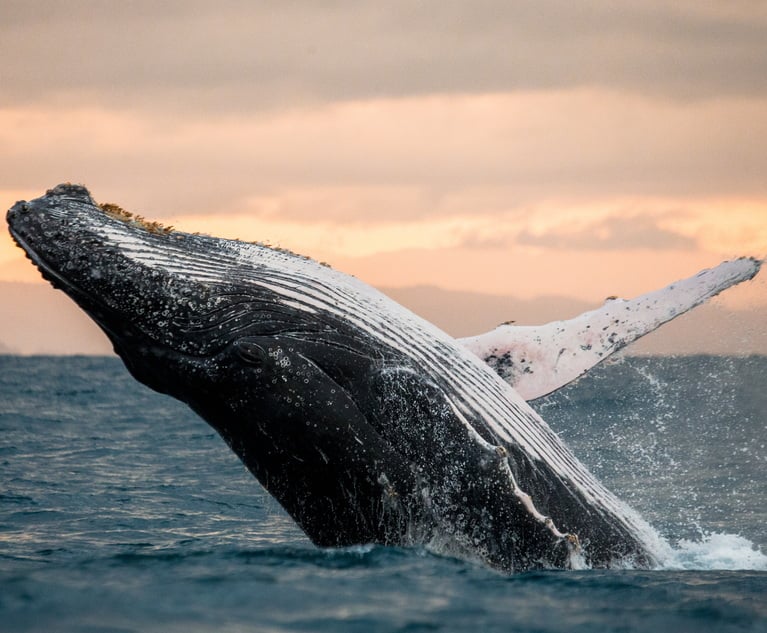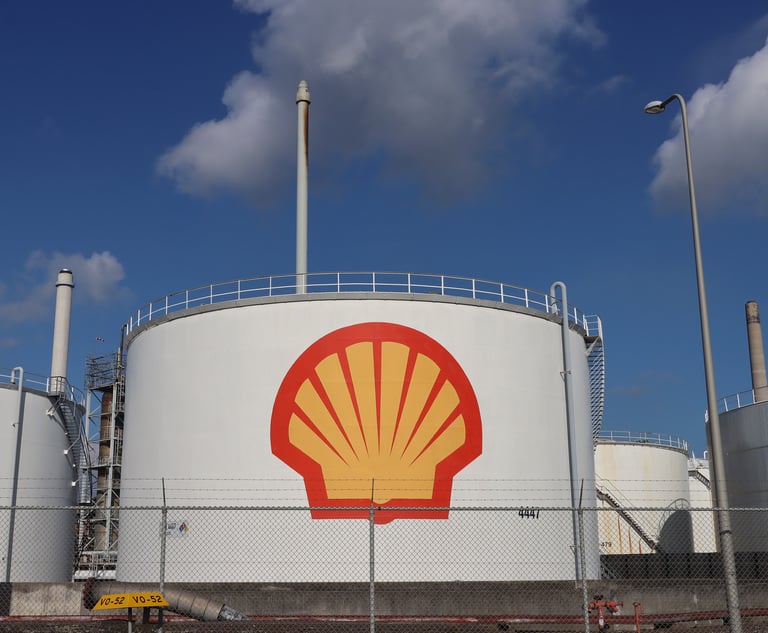'We'll never act for Gazprom now' - Yukos lawyer Emmanuel Gaillard on taking on and defeating Russia
On the face of it, when Shearman & Sterling's Emmanuel Gaillard was approached by the majority shareholders of the Yukos oil company in 2004, he faced a tough decision.
July 28, 2014 at 07:08 PM
5 minute read
On the face of it, when Emmanuel Gaillard was approached by the majority shareholders of the Yukos oil company in 2004, the international arbitration head of Shearman & Sterling faced a tough decision.
The shareholders' mandate: take an adversarial position against the Russian Federation by helping us to secure billions of dollars in damages from it.
But according to Gaillard (pictured), there was little difficulty in choosing whether to accept the instruction. "We decided in a minute," he tells Legal Week. "Sure we're never going to act for Rosneft or Gazprom now, but it was an important decision to take, and the answer to us was clear."
Was there any concern that, in accepting the role, the firm would find potential expansion into Russia difficult?
"We don't care," says a defiant Gaillard. "When we took on the matter ten years ago, I was particularly grateful to the management of the firm, which was unanimous in its decision. It was clear to them that this was going to be a high-profile case, but they also immediately saw that there was a human rights dimension."
Fast forward to July 2014, and the long-running arbitration battle has now finally reached a conclusion. Yesterday (28 July), an arbitral tribunal court in The Hague unanimously ruled that Russia must pay GML, Yukos' majority shareholders, $50bn (£29.5bn) in damages, the largest award in history.
The tribunal found that Yukos was subject to a series of "politically-motivated attacks by the Russian authorities that eventually led to its destruction" and bankruptcy, which allowed Russia to assign the company's assets to Rosneft and Gazprom, and subsequently jail majority owner and political aspirant Mikhail Khodorkovsky.
"It's the feeling of making history – the case is extraordinary not just for its magnitude, but for its highly political dimension," says Gaillard, whose team defeated Cleary Gottlieb Steen & Hamilton and Baker Botts in the process. "It's very gratifying to win."
"The fact that the tribunal hasn't shied away from the political dimension is extremely rewarding, though it is something I thought a tribunal of this calibre would do," he adds. "The language is particularly strong in certain respects, and even though it does say Yukos isn't immune to certain criticism, the judgement makes it clear that Russia acted unlawfully."
As for the suggestion put forward by some sources – that the case may have led to threats towards Gaillard and other lawyers at Shearman – the arbitrator is dismissive. "It's not true; we didn't have protection," he says, adding sardonically: "Russia can't kill all the lawyers."
Gaillard is also keen to downplay what he sees as market gossip from arbitrators who suggest Shearman was just one on a long-list of firms drawn up by Yukos in 2004. "It's not true that there was an extended beauty parade before the client chose to go with us," he says. "They hired us; it wasn't a pitch. Straight after [Yukos] met with us, they immediately cancelled their meeting with Freshfields [Bruckhaus Deringer]."
The arbitration, described by the tribunal as "mammoth…by any standards" involved 27 lawyers and seven paralegals in Shearman's team in the phase since a 2009 judgement ruled that Russia was bound by the Energy Charter Treaty, and would be subject to the court's decision.
For Shearman's part, the team incurred more than $60m (£35.3m) in fees, covering more than 130,000 hours of work by paralegals and lawyers. One of those individuals was partner Philippe Pinsolle, who in 2012 departed the firm to set up the Paris office of Quinn Emanuel Urquhart & Sullivan.
Did this cause any problems? "No," says Gaillard. "Philippe played a minor role in the case, early on. [The departure] was really an irrelevance; some people have left because they want to be the boss elsewhere; I'm going to be the boss of the arbitration group for the coming ten years, so if others want to do that, they will have to leave."
Pinsolle, for his part, says he played a central role throughout the case, and points to the fact that he participated in the final hearing and made oral submissions to the tribunal.
As for the next crop of arbitration leaders within the firm, one of those who played a key role in the Yukos affair, Paris-based counsel Jennifer Younan, is up for partnership at the end of the year. So too is fellow London-based arbitration counsel Alex Uff.
And despite its size, the case has not thrown the arbitration team out of shape, according to Gaillard, who says the practice has a huge pipeline of work around the world, and expects to keep on growing revenue year-on-year. That revenue will likely be bolstered by further work on Yukos, given Russia's possible appeal of the decision.
"We always said it was a long battle," comments Gaillard. "We won in 2009, we won today, and we are going to win enforcement in a week, or in a few years, or in ten years, whenever it eventually comes.
"I don't see Russia escaping the payment of the $50bn. Russia was of course entitled to nationalise its industries, but if they choose to do that, they have to indemnify." Nor does Gaillard think the current Ukraine crisis will affect the enforcement of the award: "It's a sensitive time, but it does not change the dynamic."
This content has been archived. It is available through our partners, LexisNexis® and Bloomberg Law.
To view this content, please continue to their sites.
Not a Lexis Subscriber?
Subscribe Now
Not a Bloomberg Law Subscriber?
Subscribe Now
NOT FOR REPRINT
© 2025 ALM Global, LLC, All Rights Reserved. Request academic re-use from www.copyright.com. All other uses, submit a request to [email protected]. For more information visit Asset & Logo Licensing.
You Might Like
View All
Simmons & Simmons Make Waves with 'Legal Personhood' Initiative for Whales
2 minute read

Leigh Day Cleared of Wrongdoing in £55M Shell Settlement with Nigeria
2 minute read
London Trial Against BHP for Role in Brazil Mining Disaster Begins
Trending Stories
- 1'It's Not Going to Be Pretty': PayPal, Capital One Face Novel Class Actions Over 'Poaching' Commissions Owed Influencers
- 211th Circuit Rejects Trump's Emergency Request as DOJ Prepares to Release Special Counsel's Final Report
- 3Supreme Court Takes Up Challenge to ACA Task Force
- 4'Tragedy of Unspeakable Proportions:' Could Edison, DWP, Face Lawsuits Over LA Wildfires?
- 5Meta Pulls Plug on DEI Programs
Who Got The Work
Michael G. Bongiorno, Andrew Scott Dulberg and Elizabeth E. Driscoll from Wilmer Cutler Pickering Hale and Dorr have stepped in to represent Symbotic Inc., an A.I.-enabled technology platform that focuses on increasing supply chain efficiency, and other defendants in a pending shareholder derivative lawsuit. The case, filed Oct. 2 in Massachusetts District Court by the Brown Law Firm on behalf of Stephen Austen, accuses certain officers and directors of misleading investors in regard to Symbotic's potential for margin growth by failing to disclose that the company was not equipped to timely deploy its systems or manage expenses through project delays. The case, assigned to U.S. District Judge Nathaniel M. Gorton, is 1:24-cv-12522, Austen v. Cohen et al.
Who Got The Work
Edmund Polubinski and Marie Killmond of Davis Polk & Wardwell have entered appearances for data platform software development company MongoDB and other defendants in a pending shareholder derivative lawsuit. The action, filed Oct. 7 in New York Southern District Court by the Brown Law Firm, accuses the company's directors and/or officers of falsely expressing confidence in the company’s restructuring of its sales incentive plan and downplaying the severity of decreases in its upfront commitments. The case is 1:24-cv-07594, Roy v. Ittycheria et al.
Who Got The Work
Amy O. Bruchs and Kurt F. Ellison of Michael Best & Friedrich have entered appearances for Epic Systems Corp. in a pending employment discrimination lawsuit. The suit was filed Sept. 7 in Wisconsin Western District Court by Levine Eisberner LLC and Siri & Glimstad on behalf of a project manager who claims that he was wrongfully terminated after applying for a religious exemption to the defendant's COVID-19 vaccine mandate. The case, assigned to U.S. Magistrate Judge Anita Marie Boor, is 3:24-cv-00630, Secker, Nathan v. Epic Systems Corporation.
Who Got The Work
David X. Sullivan, Thomas J. Finn and Gregory A. Hall from McCarter & English have entered appearances for Sunrun Installation Services in a pending civil rights lawsuit. The complaint was filed Sept. 4 in Connecticut District Court by attorney Robert M. Berke on behalf of former employee George Edward Steins, who was arrested and charged with employing an unregistered home improvement salesperson. The complaint alleges that had Sunrun informed the Connecticut Department of Consumer Protection that the plaintiff's employment had ended in 2017 and that he no longer held Sunrun's home improvement contractor license, he would not have been hit with charges, which were dismissed in May 2024. The case, assigned to U.S. District Judge Jeffrey A. Meyer, is 3:24-cv-01423, Steins v. Sunrun, Inc. et al.
Who Got The Work
Greenberg Traurig shareholder Joshua L. Raskin has entered an appearance for boohoo.com UK Ltd. in a pending patent infringement lawsuit. The suit, filed Sept. 3 in Texas Eastern District Court by Rozier Hardt McDonough on behalf of Alto Dynamics, asserts five patents related to an online shopping platform. The case, assigned to U.S. District Judge Rodney Gilstrap, is 2:24-cv-00719, Alto Dynamics, LLC v. boohoo.com UK Limited.
Featured Firms
Law Offices of Gary Martin Hays & Associates, P.C.
(470) 294-1674
Law Offices of Mark E. Salomone
(857) 444-6468
Smith & Hassler
(713) 739-1250








